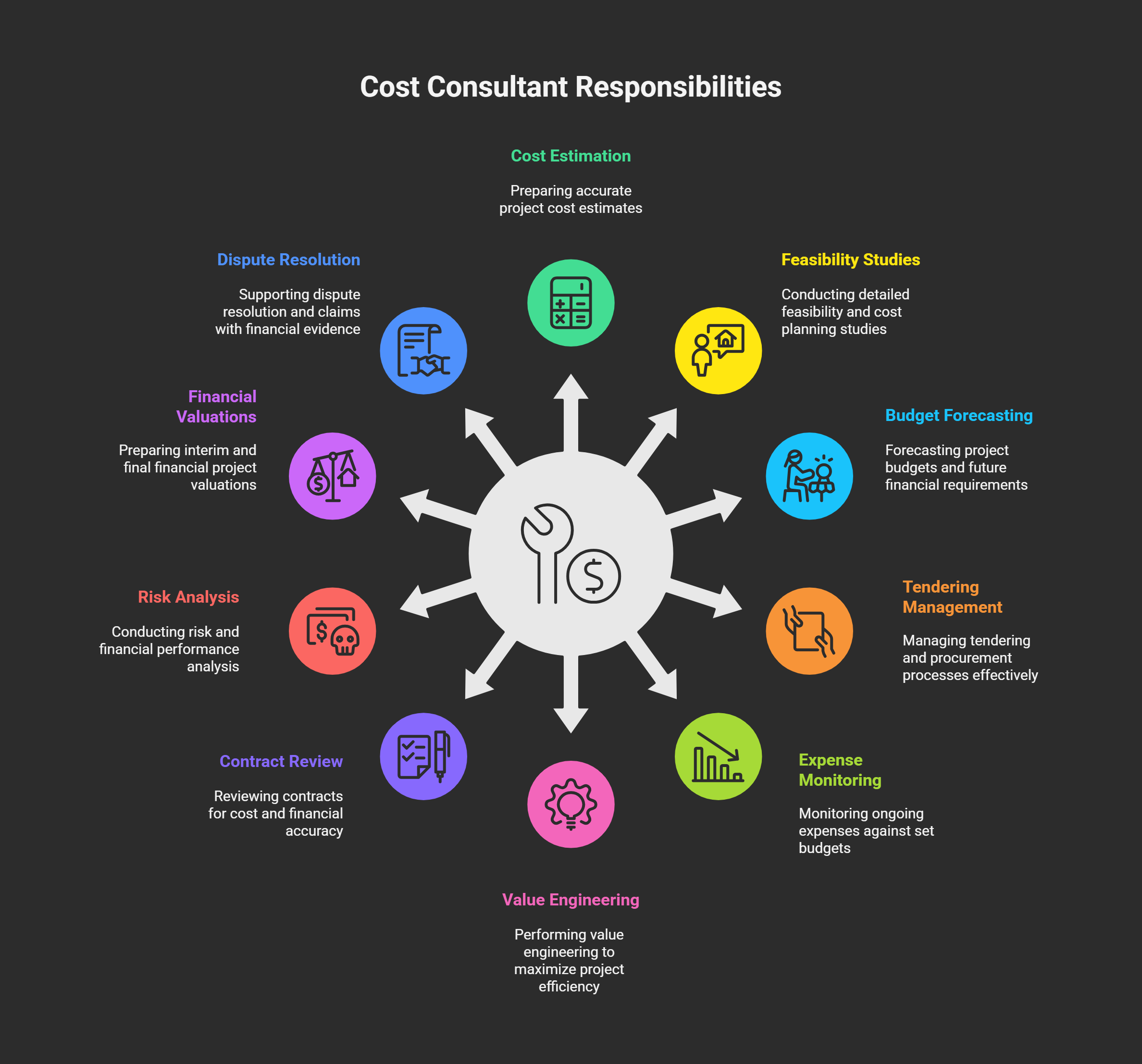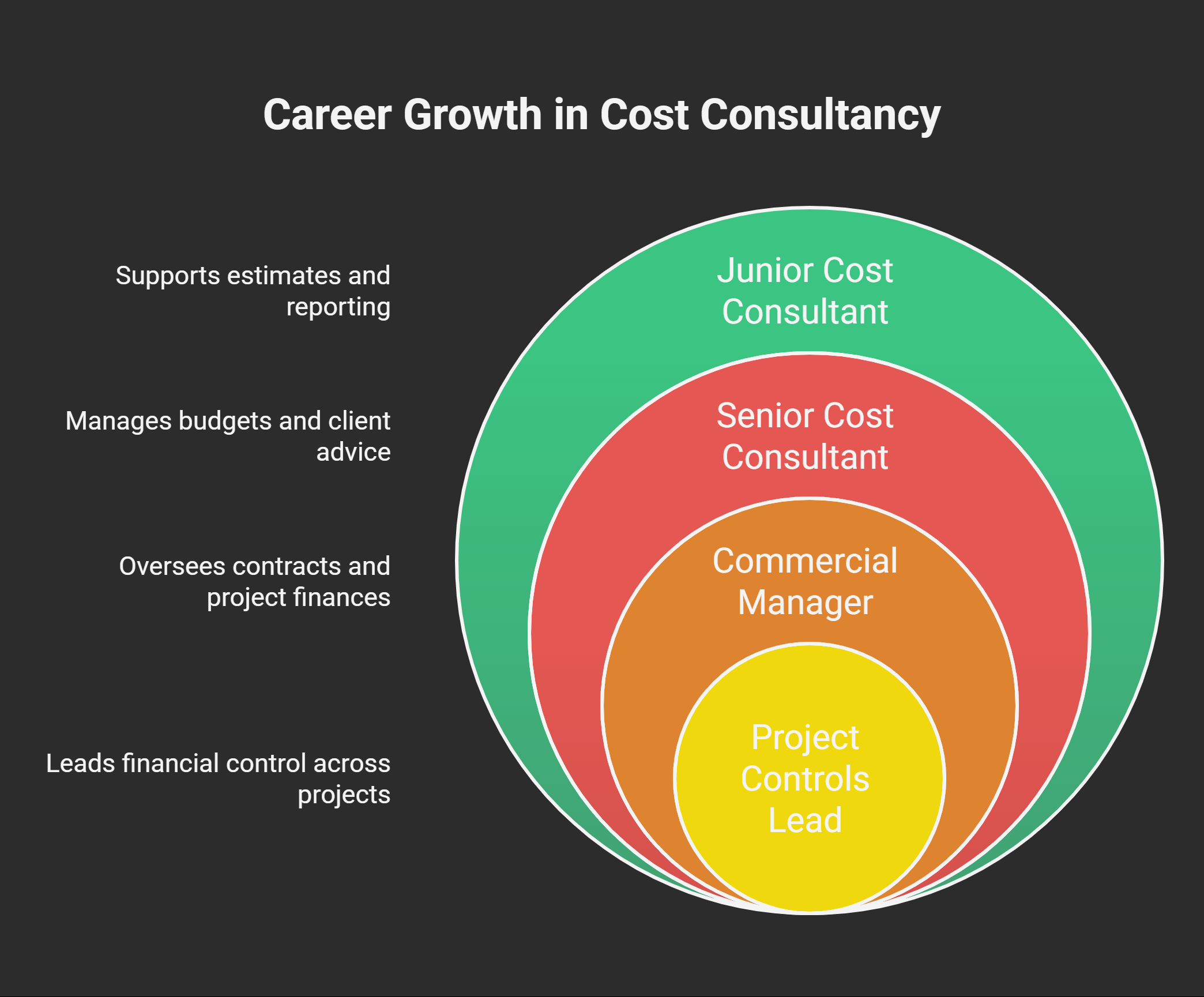Table of Contents
Cost Consultant: Roles and Responsibilities are crucial in projects. They guide financial planning from start to finish. Their expertise ensures budgets are realistic and controlled. They identify risks before they impact project success. Clients depend on them for accurate cost advice. They balance expenses while maintaining required quality standards. This makes their contribution essential in construction. Understanding their roles helps professionals build rewarding careers.
Cost consultants bring financial clarity to complex construction projects. They monitor costs and recommend strategies for efficiency. Their insights improve value for both clients and stakeholders. Industries like real estate and infrastructure depend on them. They also assist with contracts and procurement processes. Global demand shows their importance across several regions. This career path offers strong professional growth opportunities.
Key Takeaways
-
Cost consultants manage budgets, risks, and financial planning.
-
They ensure efficiency without lowering project quality.
-
Their role covers estimation, contracts, and procurement.
-
Key industries include construction, real estate, and infrastructure.
-
They use tools like CostX and BIM software.
-
Career growth is steady with global demand rising.
-
Opportunities exist in UAE, UK, Singapore, and India.
Get Career oriented MEP training with Expert Mentors! Get Free Demo Here!
Introduction
A cost consultant is vital in today’s construction projects. They guide financial decisions and ensure efficient budget control. Their expertise helps maintain quality without overspending resources. Projects achieve better results with their financial guidance.
Why they matter:
-
They prepare reliable cost estimates for planning.
-
They monitor expenses and control budget allocations.
-
They identify risks before financial problems occur.
-
They provide advice during contract and procurement stages.
Their role in projects:
-
Balancing costs with quality and functionality.
-
Supporting developers, contractors, and clients with cost advice.
-
Ensuring compliance with financial standards and regulations.
-
Delivering value through clear financial analysis and reporting.
In short, cost consultants ensure financial stability in projects. They combine technical knowledge with financial expertise effectively. This makes them essential professionals in global construction industries.
Who Is a Cost Consultant?
A cost consultant is a specialist in project finances. They plan budgets, track costs, and manage financial risks. Their focus is keeping projects within safe financial limits. They ensure money is used wisely across project stages.
Key Functions
-
Advises clients on financial decisions and cost planning.
-
Prepares cost estimates before and during project execution.
-
Balances quality standards with budgetary restrictions.
-
Supports procurement and contract negotiations with cost analysis.
Role in Industry
Cost consultants work across construction, real estate, and infrastructure. They act as trusted advisors for clients and contractors. Their expertise creates value and avoids unnecessary financial waste.
Master MEP Design with Industry-Leading Training!
Gain in-depth knowledge of Mechanical, Electrical, and Plumbing (MEP) Design with expert-led courses. Learn HVAC, fire safety, sustainable building strategies, and BIM applications to excel in the construction industry.
Know MoreCore Roles and Responsibilities
Main Duties
-
Preparing accurate project cost estimates.
-
Conducting detailed feasibility and cost planning studies.
-
Forecasting project budgets and future financial requirements.
-
Managing tendering and procurement processes effectively.
-
Monitoring ongoing expenses against set budgets.
-
Performing value engineering to maximize project efficiency.
-
Reviewing contracts for cost and financial accuracy.
-
Conducting risk and financial performance analysis.
-
Preparing interim and final financial project valuations.
-
Supporting dispute resolution and claims with financial evidence.
Sample Responsibilities Table
| Area | Responsibility Example |
|---|---|
| Planning | Create budget forecasts and cost studies |
| Procurement | Manage tendering and supplier negotiations |
| Monitoring | Track expenses and control project budgets |
| Value | Apply value engineering for cost efficiency |
| Reporting | Deliver financial reports and valuations |
Key Skills and Tools Used
Cost consultants need both technical and soft skills. These skills help them manage projects and budgets effectively. They also rely on modern tools for accurate work.
Essential Skills
-
Analytical Ability: Understand numbers and financial data clearly.
-
Communication: Explain financial issues to clients and teams.
-
Negotiation: Manage contracts and supplier agreements effectively.
-
Problem-Solving: Find solutions for financial project challenges.
-
Attention to Detail: Avoid errors in estimates and reports.
Common Tools
-
MS Excel: Widely used for budgeting and analysis.
-
CostX: Popular tool for cost estimation tasks.
-
Primavera: Used for scheduling and cost control.
-
BIM Software: Integrates design with cost data efficiently.
Skills and Tools Table
| Skills | Tools Commonly Used |
|---|---|
| Analytical Skills | MS Excel, CostX |
| Communication | Reports, Presentations |
| Negotiation | Procurement Platforms |
| Problem-Solving | Primavera, Risk Tools |
| Technical Skills | BIM-based Applications |
These combined skills and tools shape effective cost consultants.
Get Career oriented MEP training with Expert Mentors! Get Free Demo Here!
Difference Between Cost Consultant and Quantity Surveyor
Cost consultants and quantity surveyors are often confused roles. Both focus on project costs but their scope differs. A cost consultant acts as a broader financial advisor. A quantity surveyor works more closely with technical measurements.
Cost Consultant Focus
-
Provides strategic advice on overall project finances.
-
Guides clients on cost risks and budget planning.
-
Manages procurement and value engineering for efficiency.
-
Focuses on maximizing value across entire project lifecycle.
Quantity Surveyor Focus
-
Measures materials and quantities for construction accuracy.
-
Prepares bills of quantities for tendering processes.
-
Tracks costs during construction on-site activities.
-
Ensures contractors are paid for accurate work done.
Key Differences Table
| Aspect | Cost Consultant | Quantity Surveyor |
|---|---|---|
| Main Role | Financial advisor | Measurement specialist |
| Focus | Strategic cost management | Technical cost control |
| Client Support | Budget, procurement, planning | On-site cost monitoring |
| Approach | Big-picture financial view | Detail-focused quantity work |
Both roles complement each other in project success.
Master MEP Design with Industry-Leading Training!
Gain in-depth knowledge of Mechanical, Electrical, and Plumbing (MEP) Design with expert-led courses. Learn HVAC, fire safety, sustainable building strategies, and BIM applications to excel in the construction industry.
Know MoreCareer Path & Industries Hiring
Cost consultants enjoy strong career prospects worldwide. Their expertise is valued in multiple growing industries. They work with construction, infrastructure, and real estate companies. Consulting firms also hire them for financial project guidance.
Common Employers
-
Construction firms managing large-scale building projects.
-
Consulting companies offering specialized financial services.
-
Real estate developers handling residential and commercial projects.
-
Infrastructure organizations managing transport, energy, and public works.
Career Growth Path
-
Junior Cost Consultant → Supports estimates and reporting.
-
Senior Cost Consultant → Manages budgets and client advice.
-
Commercial Manager → Oversees contracts and project finances.
-
Project Controls Lead → Leads financial control across projects.
Global Demand
High demand exists in UAE, UK, Singapore, and India. Expanding infrastructure drives need for skilled cost consultants globally.
Career Overview Table
| Career Stage | Key Focus Area |
|---|---|
| Junior Consultant | Estimates, reports, cost support |
| Senior Consultant | Budgeting, client communication |
| Commercial Manager | Contracts, financial oversight |
| Project Controls Lead | Strategy, project-wide control |
Training programs, like Entri’s MEP Quantity Surveying Course, help learners gain practical skills for global opportunities.
Conclusion
Cost consultants play a vital role in modern projects. They ensure budgets are realistic and risks are managed. Their advice helps clients achieve value without sacrificing quality. By balancing costs and functionality, they protect project success. Industries like construction and infrastructure depend on their expertise. Global demand continues to grow across UAE, UK, and India. This makes cost consultancy a secure and rewarding profession.
For aspiring professionals, proper training is highly recommended. Practical learning builds skills needed for real-world project challenges. Entri’s MEP Quantity Surveying Course provides strong industry-focused training. The course prepares learners for roles in global markets. It covers estimation, budgeting, procurement, and cost control methods. With the right skills, career growth becomes more achievable. This path offers stability, growth, and global opportunities for learners.
Master MEP Design with Industry-Leading Training!
Gain in-depth knowledge of Mechanical, Electrical, and Plumbing (MEP) Design with expert-led courses. Learn HVAC, fire safety, sustainable building strategies, and BIM applications to excel in the construction industry.
Know MoreFrequently Asked Questions
What does a cost consultant actually do?
A cost consultant manages the financial side of construction projects. They prepare cost estimates, track expenses, and ensure budgets remain under control throughout the project lifecycle. Their role also includes analyzing risks, advising clients on financial decisions, and applying value engineering to increase efficiency. They balance quality requirements with financial constraints, making sure resources are used effectively. In short, they act as trusted advisors to developers, contractors, and clients, ensuring projects are both cost-efficient and successful.
How is a cost consultant different from a quantity surveyor?
A quantity surveyor primarily measures materials, quantities, and costs at a technical level. They focus on preparing bills of quantities, monitoring on-site costs, and ensuring contractors are paid correctly for work completed. A cost consultant, on the other hand, provides broader financial advice that covers project planning, procurement, contract negotiation, and long-term budgeting. While quantity surveyors look more at the technical side, cost consultants view the big financial picture. Both roles complement each other, but the cost consultant’s focus is more client-oriented and strategic.
What industries hire cost consultants?
Cost consultants are mainly hired by construction firms and infrastructure companies. They are also employed by real estate developers for residential and commercial projects. Consulting companies often bring cost consultants on board to provide specialized financial advice for clients. In addition, government agencies and infrastructure organizations hire them for public works, transport projects, and large-scale developments. This wide range of industries creates steady and global opportunities for skilled professionals.
What career growth opportunities exist for cost consultants?
A cost consultant usually starts as a junior consultant, focusing on estimates and supporting senior professionals. With experience, they can move into senior roles managing budgets, risk analysis, and direct client communication. Further progression includes roles like commercial manager, where they oversee contracts and financial strategy, and project controls lead, where they manage financial planning across multiple projects. Each level comes with more responsibility, higher salaries, and greater decision-making power. With the right skills and global demand, career growth in this field is both structured and rewarding.
What skills are essential for a cost consultant?
A cost consultant needs both technical and soft skills. Technical skills include financial analysis, cost estimation, budgeting, and knowledge of procurement processes. Soft skills like communication, negotiation, and problem-solving are equally important because they often interact with clients and contractors. Attention to detail is critical to avoid financial errors in large projects. With a mix of these skills, cost consultants can ensure smooth financial control and deliver better value in projects.
Which tools are commonly used by cost consultants?
Cost consultants rely on both traditional and modern tools. MS Excel remains one of the most widely used tools for budgeting and cost analysis. CostX is a specialized software for estimation tasks, providing accurate digital takeoffs and calculations. Primavera is used for scheduling and cost control, especially in larger projects. BIM software is also gaining popularity, allowing consultants to integrate design data with financial forecasting, making their role more effective in modern construction.
Is cost consultancy a good global career choice?
Yes, cost consultancy is a strong career option globally. Countries like UAE, UK, Singapore, and India have high demand for skilled cost consultants due to rapid construction and infrastructure growth. The career offers stability, as financial expertise is needed in almost every project. Professionals can find opportunities in consulting firms, multinational companies, and government projects. With continuous upskilling and certifications, a cost consultant can build a rewarding international career.
How do cost consultants add value to a project?
Cost consultants help projects achieve financial discipline and efficiency. By preparing realistic cost estimates, they prevent overspending before construction even begins. During execution, they monitor expenses and identify cost-saving opportunities without compromising quality. They also guide clients in contracts and procurement, ensuring fair pricing and reduced risks. Their ability to balance costs and value ensures projects remain sustainable, profitable, and competitive in the market.
What qualifications are needed to become a cost consultant?
A degree in quantity surveying, construction management, civil engineering, or finance provides a strong foundation. Many professionals also pursue specialized diplomas or certifications in cost management. Practical training programs, such as Entri’s MEP Quantity Surveying Course, help learners gain real-world skills in estimation, budgeting, and cost control. Proficiency with software tools like CostX, Primavera, and BIM is often required. With both academic knowledge and practical experience, candidates can build strong career opportunities in cost consultancy.
How can Entri’s MEP Quantity Surveying Course help aspiring consultants?
Entri’s MEP Quantity Surveying Course is designed to provide practical and job-ready skills. It covers topics like cost estimation, tendering, procurement, and project budgeting, all of which are crucial for a cost consultant. The course also teaches software tools and practical case studies, ensuring learners understand real-world applications. With structured training, learners can move confidently into roles like junior cost consultant or quantity surveyor. This program helps bridge the gap between theory and practice, preparing candidates for strong global careers in cost consultancy.













